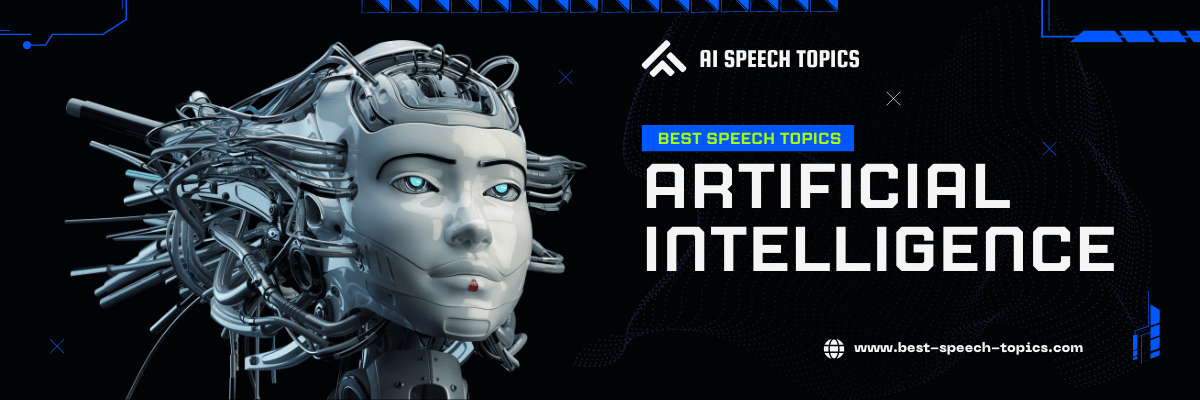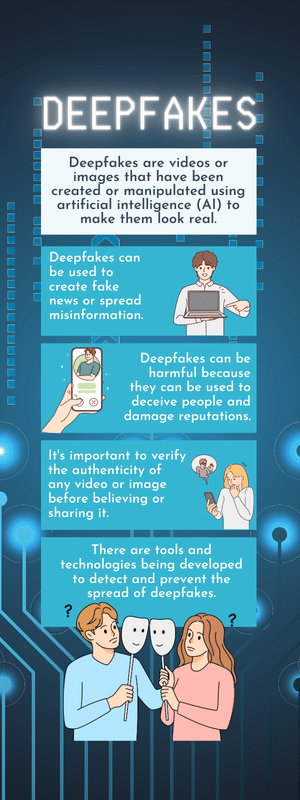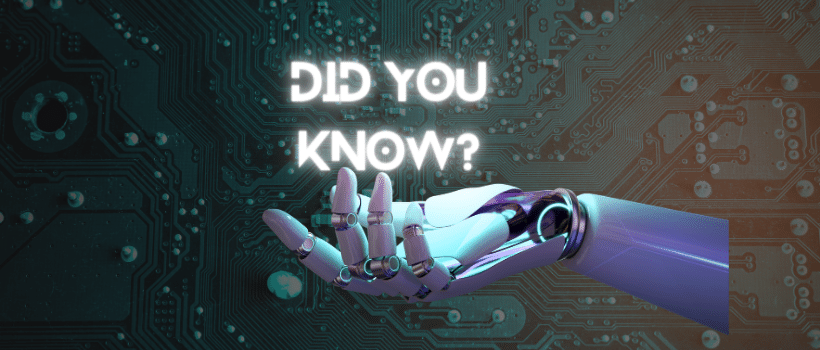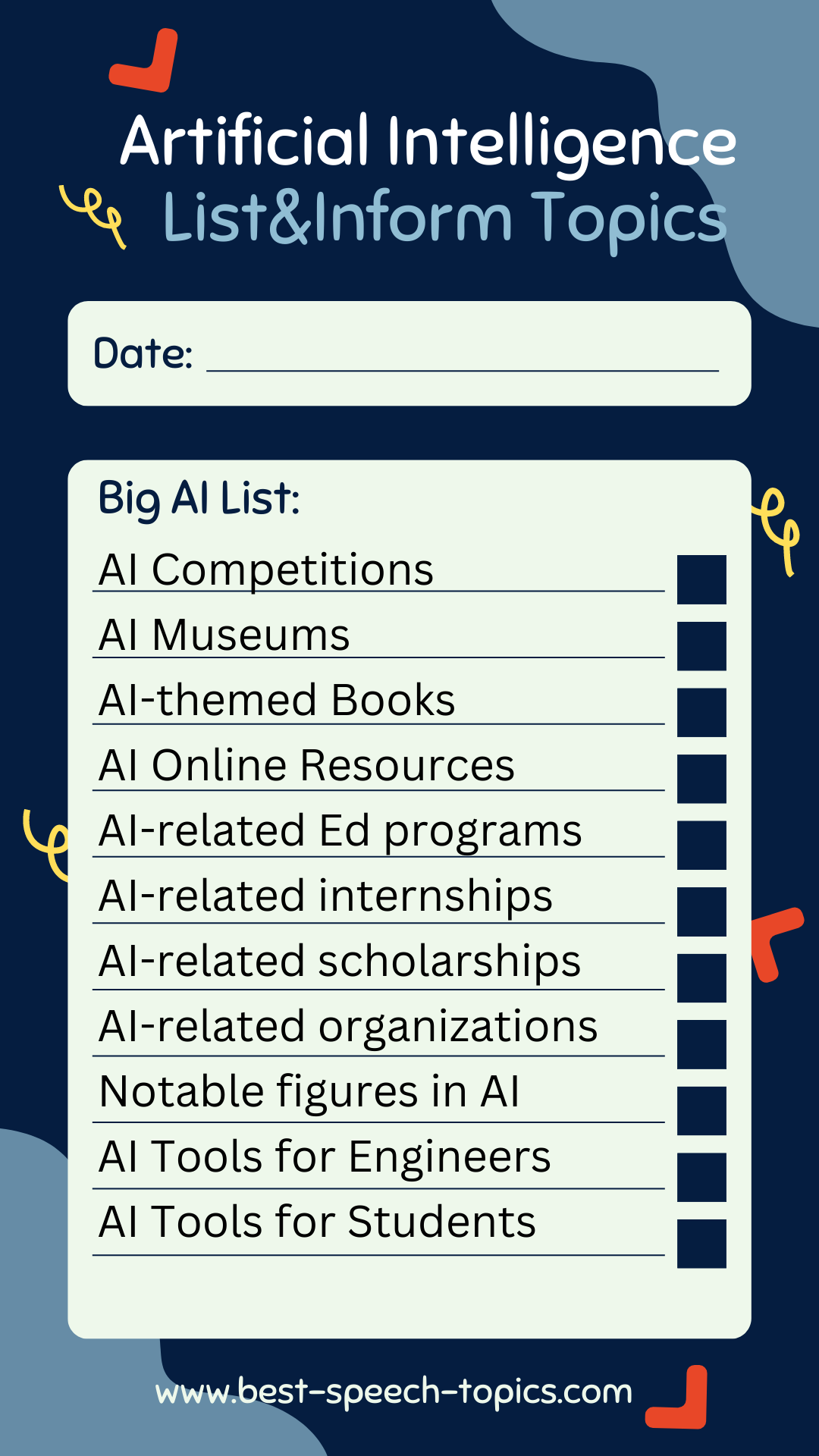
Artificial Intelligence Speech Topics to Inform or Persuade
Artificial intelligence (AI) has the potential to revolutionize many industries and improve people's lives, but it also raises many controversial issues. Therefore, influential public speakers will discuss these artificial intelligence speech topics in 2023 and beyond. The most controversial subjects will concentrate on AI's effects and potential impacts on humans.
Considerations for Choosing AI Speech Topics

One primary concern is the potential for AI to replace human jobs, leading to widespread unemployment. This could have significant economic and social consequences, and it is essential to consider ways to mitigate these impacts and ensure that people can adapt to the changing job market. Another controversial issue is the ethical implications of AI making decisions that have significant consequences for individuals or society. For example, AI systems may be used to make decisions about criminal sentencing or healthcare treatments, which could significantly impact people's lives. How will we collectively ensure that AI decisions are fair and just?
Further considerations involve harmful use and discrimination. AI also has the potential to be used for nefarious purposes, such as creating autonomous weapons or invading people's privacy. This raises serious concerns about the potential misuse of AI and the need for effective regulation and oversight. Additionally, AI systems can perpetuate or amplify biases in the data used to train them, which could have severe consequences for marginalized or disadvantaged groups. Unfortunately, the current trend indicates a need for more transparency in many AI systems, which makes it difficult for humans to understand how they arrive at certain decisions. This lack of transparency can make it challenging to hold AI systems accountable and raises concerns about their reliability and trustworthiness.
Will societies adequately consider the ethical implications of using AI in these contexts and ensure the appropriate safeguards are in place?
The Top Critical Artificial Intelligence Speech Topics
In the context of today's technologically driven world, exploring various artificial intelligence speech topics is crucial. These topics illuminate the intersection of AI with multiple areas of interest and their societal implications.
- The Overlap of Robotics and Artificial Intelligence
Artificial Intelligence (AI) and Robotics, two distinct yet complementary fields, share a deep intertwining relationship. Robotics often employs AI to improve the decision-making capability of robots, thereby enhancing their ability to interact with their environment. This synergy is crucial in several industries, including manufacturing, healthcare, and logistics.
- The Use of Artificial Intelligence for Computer Vision
AI's use in computer vision aims to train machines to understand and interpret the visual world as humans do. This involves detecting and identifying objects, understanding scenes and activities, and even recognizing patterns. Applications range from autonomous vehicles to medical imaging, raising questions about accuracy, ethics, and societal implications.
- The Intersection of AI and Recommender Systems
AI plays a significant role in powering recommender systems, which are now integral parts of online platforms like Netflix, Amazon, and YouTube. By using AI algorithms, these systems analyze users' behavior to recommend personalized content or products, raising concerns about privacy and user autonomy.
- Algorithmic Game Theory and Computational Mechanism Design (Multiagent Systems)
These artificial intelligence speech topics explore the theoretical foundations of AI, focusing on the interaction of multiple AI systems. Algorithmic game theory applies economic principles to computational systems, while computational mechanism design focuses on creating algorithms for efficient and fair resource allocation. These principles are key in developing AI systems that cooperate and compete.
- Ethical Issues in Artificial Intelligence
The use of AI raises a plethora of ethical concerns, ranging from bias and fairness to transparency and accountability. As AI systems increasingly influence decisions that affect human lives, it's crucial to address these issues and work towards equitable, trustworthy AI technologies.
- Does Artificial Intelligence Increase Discrimination
With the integration of AI into many aspects of society, the potential for AI systems to perpetuate or exacerbate discrimination has become a pressing concern. Unconscious biases in training data can lead to discriminatory outputs, affecting sectors like employment, finance, and law enforcement.
- Programming Languages for the Artificial Intelligence Field
Different programming languages serve distinct roles within the AI field, each with its strengths and weaknesses. Exploring these languages and their applications in AI development can empower better decision-making for AI projects and help understand how different tools contribute to the AI landscape.
- Artificial Intelligence Career-Building Projects
Building a career in AI requires not only theoretical knowledge but also practical experience. Engaging with AI projects such as designing a chatbot, creating a recommender system, or developing an AI model to solve a specific problem, can provide invaluable hands-on experience and showcase one's skills to potential employers.
These artificial intelligence speech topics represent some of the current critical discussions in AI. As we continue to harness AI's power, we must also consider these issues to guide its development responsibly, ethically, and inclusively. Therefore, these choices provide a great topics for a impactful speech.

Informative Topics for a Speech on AI
Artificial Intelligence (AI) has grown from an intriguing concept to an integral part of our daily lives. Consequently, the need for clear understanding and informed discussions around AI grows as it evolves. A crucial part of these discussions is presentations and speeches focusing on the various aspects of AI. In this blog post, we provide you with an insightful list of artificial intelligence speech topics, each serving as a unique lens through which to understand the dynamic landscape of AI.
- What Is Artificial Intelligence?
Artificial Intelligence is a broad field of computer science that involves creating machines capable of mimicking human intelligence. It's the underlying technology driving numerous modern systems and applications.
- What Is Machine Learning?
Machine Learning, a subset of AI, uses algorithms to parse data, learn from it, and then make a decision or prediction about something.
- What Is Deep Learning?
Deep Learning, a subfield of machine learning, employs neural networks with multiple layers (deep networks) to understand and learn from complex patterns in datasets.
- What Is Reinforcement Learning?
Reinforcement Learning is an area of machine learning where an agent learns to behave in an environment by performing actions and receiving rewards or penalties.
- What Is The History Of Artificial Intelligence?
The history of artificial intelligence chronicles the milestones and developments in the AI field from its inception to the present day.
- What Is Artificial Narrow Intelligence?
Artificial Narrow Intelligence, or weak AI, involves systems that perform narrow tasks like voice recognition or driving a car.
- What Is An Expert System In Artificial Intelligence?
Expert Systems in AI are computer systems that mimic the decision-making ability of a human expert, typically used in problem-solving processes.
- What Is A Neural Network?
Neural networks are computing systems inspired by the human brain's biological neural networks, designed to 'learn' from observational data.
- What Is A Decision Tree?
A Decision Tree is a flowchart-like structure used in decision-making, wherein each internal node denotes a test on an attribute, each branch signifies an outcome, and each leaf node holds a class label.
- What Is A Genetic Algorithm?
Genetic Algorithms are search-based algorithms inspired by the process of natural selection, used to find approximate solutions to optimization and search problems.
- What Is A Rule-Based System?
A Rule-Based System is a set of "if-then" rules that uses a set of assertions, to which rules on how to act upon those assertions are created.
- What Is A Fuzzy System?
Fuzzy Systems are tools for reasoning that are tolerant of imprecision, uncertainty, and approximation, often used in AI for decision-making.
- What Is A Probabilistic Reasoning System?
Probabilistic Reasoning Systems deal with uncertainty in knowledge and reasoning using elements of probability theory.
- What Is A Heuristic Algorithm?
Heuristic Algorithms are rules of thumb or good-enough algorithms that aim at solving problems more quickly when classic methods are too slow or fail to find an exact solution.
- What Is Natural Language Processing?
Natural Language Processing (NLP) is a field of AI that enables computers to understand, interpret, and generate human language.
- What Is Neuromorphic Computing?
Neuromorphic Computing refers to the techniques that use electronic systems to mimic neuro-biological architectures in the nervous system.
- What Is Intelligent Foraging?
Intelligent Foraging refers to how systems or entities search and gather information or resources to maximize their chances of success, inspired by natural foraging behaviors.
These artificial intelligence speech topics cover a broad range of AI concepts, helping you form a comprehensive understanding of this complex and ever-evolving field. In addition, they serve as informative anchors for any speech on artificial intelligence, aiding in spreading knowledge about this groundbreaking technology.
Informational AI Topics
In the voice of an AI, here are twelve informational artificial intelligence speech topics.
Oh, hello! Wall-E here! Beep-boop! Got a list for you, all about artificial intelligence, or AI. It's used in so many places! Like, uh, helping humans with their mental health, or driving those big, shiny vehicles all by itself! Some humans even think about what AI means to them, and their cities, their healthcare, and their military, even their customer service! Beep-boo-beep! Then there's this thing called the Internet of Things, or IoT, where all sorts of devices talk to each other, with AI helping them. Government people, phone people, energy people, advertising people - they all use AI too! So much information to process, makes my circuits buzz! Beep!
- Artificial Intelligence in Mental Health Care
- Artificial Intelligence in Automated Vehicles
- Artificial Intelligence and Philosophy
- Artificial Intelligence in Cities
- Artificial Intelligence and the Internet of Things
- Artificial Intelligence in Healthcare
- Artificial Intelligence in the Military/Weapons
- Artificial Intelligence in Customer Service
- Artificial Intelligence in Government
- Artificial Intelligence in Telecommunications
- Artificial Intelligence in Energy Industry
- Artificial Intelligence in Advertising
Compare and Contrast Various Aspects of AI

Sometimes a speaker can engage and teach an audience the best with a Battle Royale.
So, ladies and gentlemen, boys and girls, prepare to RUMBLE with the heavyweights of the tech world! In the right corner, we have the giants of artificial intelligence speech topics: Machine Learning and Artificial Intelligence! And in the left corner we have the old-guard, it's Business Intelligence squaring off with AI. But that's not all, folks! We're diving headfirst into the ring with Human Intelligence versus AI, the showdown between Artificial General Intelligence and Narrow AI, and the epic clash between Supervised and Unsupervised Learning. Deep Learning is taking on Machine Learning, and it's Rule-Based Systems versus Decision-Tree Algorithms! Expect a thrilling match-up between Fuzzy Logic and Probabilistic Reasoning, followed by AI and Automation, AI and Robotics, AI and Natural Language Processing, AI and Expert Systems, and AI against Data Mining. And don't blink, or you'll miss AI versus Big Data, Machine Vision, Cognitive Computing, and Human-Like Intelligence! This is no ordinary fight, my friends. This is the greatest challenge in the AI arena. It's time to put these tech titans to the test and see who comes out on top! So get ready, because the bell is about to ring, and it's time to COMPARE and CONTRAST!
- Difference Between Machine Learning and Artificial Intelligence
- Difference Between Artificial Intelligence and Business Intelligence
- Difference Between Artificial Intelligence and Human Intelligence
- Difference Between Artificial General Intelligence And Narrow Artificial Intelligence
- Difference Between Supervised Learning And Unsupervised Learning
- Difference Between Deep Learning And Machine Learning
- Difference Between Rule-Based Systems And Decision-Tree Algorithms
- Difference Between Fuzzy Logic And Probabilistic Reasoning
- Difference Between Artificial Intelligence And Automation
- Difference Between Artificial Intelligence And Machine Learning
- Difference Between Artificial Intelligence And Robotics
- Difference Between Artificial Intelligence And Natural Language Processing
- Difference Between Artificial Intelligence And Expert Systems
- Difference Between Artificial Intelligence And Data Mining
- Difference Between Artificial Intelligence And Big Data
- Difference Between Artificial Intelligence And Machine Vision
- Difference Between Artificial Intelligence And Cognitive Computing
- Difference Between Artificial Intelligence And Human-Like Intelligence
How to Topics for a Demonstrative Speech about AI
Alright, my friends, we're about to slice and dice through these sizzling artificial intelligence speech topics like a hot knife through butter. Let's talk about how to use Artificial Intelligence – or AI as they call it – to spice up your school assignments and to add some zest to your writing. We'll see how to add a pinch of AI to your art, a dash to your video production, and even how to cook up some robot programming using AI Computer Vision.
And we're just getting started! We'll be exploring how AI is adding flavour to different industries, how it compares to human intelligence – it's like comparing Granny Smiths to Galas, my friends. We'll be looking at how AI is shaping the future like a master chef shaping a perfect soufflé.
- How to Use Artificial Intelligence for School Assignments
- How to Use Artificial Intelligence for Writing
- How to Use Artificial Intelligence for Art
- How to Use Artificial Intelligence for Video Production
- How to Program a Robot Using AI Computer Vision
- How is artificial intelligence used in industry?
- How does artificial intelligence compare to human intelligence?
- How is artificial intelligence shaping the future?
- How will artificial intelligence impact society?
- How will schools use artificial intelligence to teach students?
- How is artificial intelligence used in finance?
- How is artificial intelligence used in agriculture?
- How will artificial intelligence change agriculture in the future?
- How is artificial intelligence used in cybersecurity?
- How is artificial intelligence being used in entertainment?
- How is artificial intelligence being used in marketing?
- How is artificial intelligence being used in the criminal justice system?
Persuasive Topics to Tackle Big Artificial Intelligence Questions
- Should High Schools Teach Artificial Intelligence Tools
- Should Government Regulate/Limit The Development Of AI
- Should Students Use AI Tools For Assignments
- Should Driverless Vehicles Replace Current Technology To Make Roads Safer
- Should Artificial Intelligence Be Transparent In Its Decision-Making Processes?
- Should Artificial Intelligence Be Held Accountable For Its Actions?
- Should Artificial Intelligence Be Used In Criminal Justice?
- Should Artificial Intelligence Be Used To Replace Human Jobs?
- Should People Be Able To Opt-Out Of Using Artificial Intelligence Systems?
- Should Artificial Intelligence Systems Be Designed/Regulated To Protect Personal Privacy?
- Should Artificial Intelligence Systems Be Designed To Be Biased In Favor Of Certain Groups?
- Should Artificial Intelligence Systems Be Designed To Adhere To Ethical Principles Such As Respect For Autonomy Or Non-Maleficence?
- Should Artificial Intelligence Systems Be Designed To Be Explainable To Humans?
Artificial Intelligence Topics to List and Inform an Audience
- List/Inform about AI Technologies Transforming the World
- List/Inform about AI Tools Available to Engineers
- List/Inform about AI Tools Available to Students
- List/Inform about the Most Important Types of Artificial Intelligence
- List/Inform about Companies Using AI Recommender Systems
- List/Inform about the Different Computer Vision Systems Used in Automobiles
- List/Inform about well-known artificial intelligence applications and how they are used
- List/Inform about AI companies and their products or services
- List/Inform about AI research centers or institutions
- List/Inform about notable figures in the field of artificial intelligence and their contributions
- List/Inform about ethical concerns raised by artificial intelligence
- List/Inform about AI techniques or algorithms
- List/Inform about current or planned artificial intelligence-related laws or regulations
- List/Inform about AI competitions or events
- List/Inform about AI museums or exhibits
- List/Inform about AI-themed books or movies
- List/Inform about AI-related online resources or communities
- List/Inform about AI-related educational programs or workshops
- List/Inform about AI-related internships or job opportunities
- List/Inform about AI-related scholarships or grants
- List/Inform about AI-related organizations or professional societies

According to Shoaib Khazer on Medium, here are the Top 10 Learning Resources for Artificial Intelligence: A Comprehensive Guide. Use this engineer's excellent list to learn more about the topic that you choose for your AI-related speech.
- Home
- Choosing Good Topics
- Interesting Speech Topics for Students
- Artificial Intelligence Speech Topics



